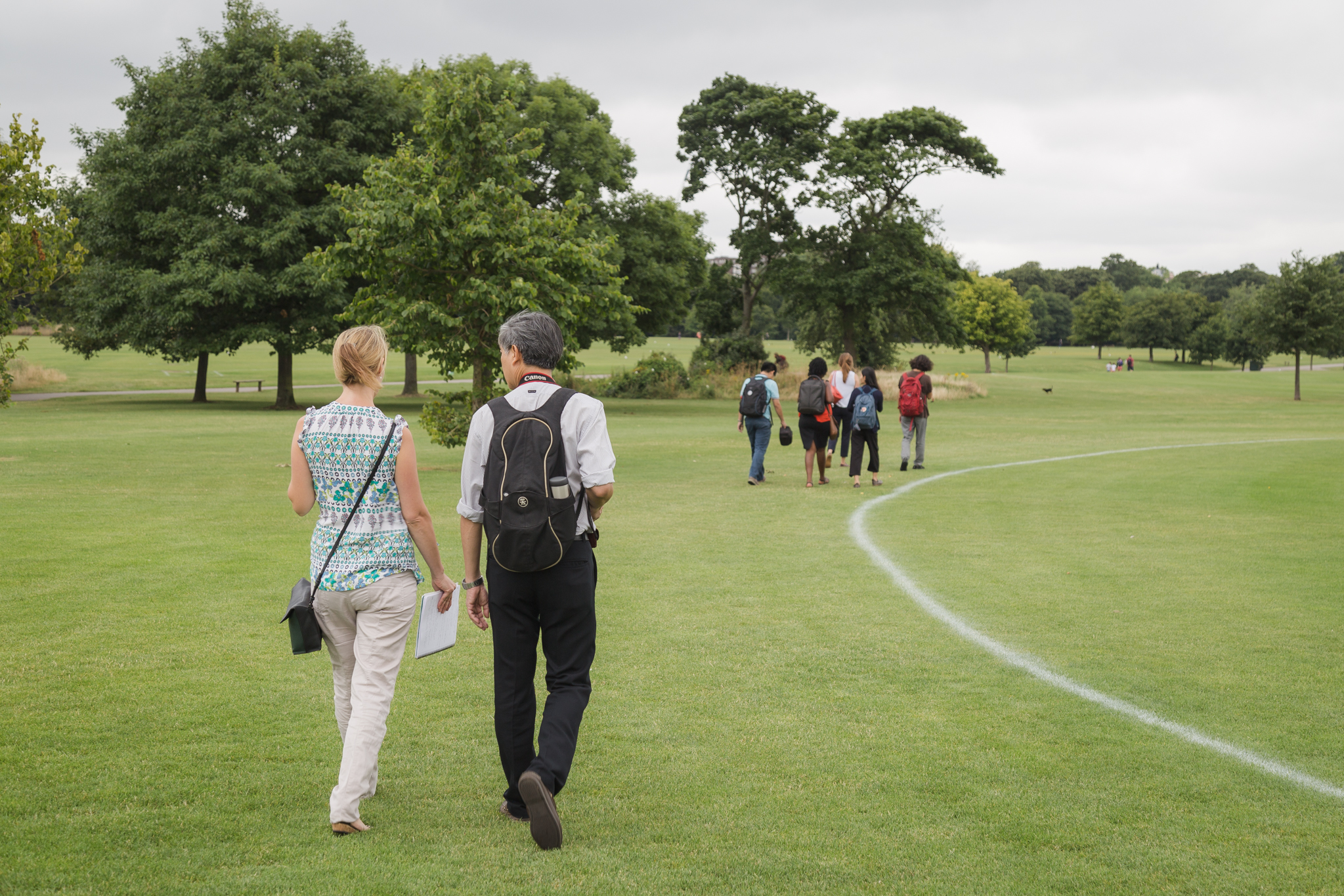
In this AMIS Commentary, Alice Tompson presents reflections on the collaborative working of the Antimicrobials in Society research teams, based in Thailand, Uganda and the United Kingdom.
- Introduction
Reimagining global health
Addressing the inbuilt power imbalances in global health necessitates recognising and reimagining the ways it is funded, researched, implemented and taught (Pai, 2021). The colonial legacies infusing international research partnerships are increasingly being scrutinised (Lawrence and Hirsch, 2020) and the inbuilt systems of dominance and power, underpinned by racism, capitalism and sexism, are being rendered visible and challenged (Chaudhuri et al., 2021; Khan et al., 2021). Extending beyond colonialism, patriarchy, white saviourism and the foreign gaze have resulted in a lack of diversity, equity and inclusion that needs to be confronted (Abimbola et al., 2021).
Anthropologists have been described as ‘awkward relations’ to global health practitioners, able to work within, against, and in-between their expertise (Yates-Doerr, 2019; Yates-Doerr and Maes, 2019). As such they, and other social scientists, have become embroiled in the project of reimagining ways of doing research and the types of knowledge that matter in global health (Richardson, 2019; Hinchliffe, 2021). How might a research project conducted by a team of anthropologists and led by an anthropologist go about challenging the power imbalances at play in global health research?
The AMIS project
The Antimicrobials in Society programme (2017-2021) (AMIS, 2021) sought to better understand the roles of antimicrobials in everyday life, thus informing efforts seeking to address antimicrobial resistance (AMR). These fresh perspectives were fostered by encouraging collaborative social science thinking and interdisciplinary engagements via two work strands. Firstly, the AMIS hub which connected the community of researchers working in this field through a newsletter, events and a website (https://antimicrobialsinsociety.org/), which also showcased high quality social science research and theory for a general audience. Secondly through research conducted in Thailand and Uganda that drew on the productiveness of ethnographic comparison (Kuper, 2004) to provide new empirical and theoretical contributions. It is the latter which it the focus of this article.
Below, AMIS co-investigators reflect upon what it was like trying to enact a global health project that sought to be genuinely collaborative. Rather than offering a toolkit or template, these insights offer a series of reflections on attempting to confront the infrastructures of global health. The quotes are taken from a series of interviews conducted by the lead author, a researcher based in London. This study design was intended to minimise the additional workload for the Thai and Ugandan research teams, who were already busy writing up their research activities but who were keen to share their reflections. The resulting output, then, represents another example of a researcher in the global North speaking for those in the global South (Lawrence and Hirsch, 2020). A draft of the text was circulated amongst the co-investigators for comments and revised accordingly.
- Findings
The co-investigators’ narratives centre on creating connections: those between researchers in different countries, those between ethnographic insights in separate field spaces and those between empirical and theoretical data. Interview insights are arranged into four interconnected areas: building-in collaboration; fostering connections; making fruitful comparisons; and writing together under pandemic conditions.
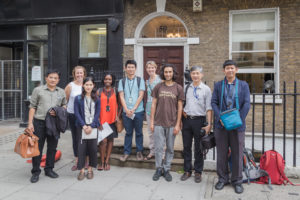
Building-in collaboration
The programme was designed so that the empirical research was led by local co-investigators and conducted by local research teams. Professor Clare Chandler based at London School of Hygiene and Tropical Medicine explains:
“One thing that we’ve been really trying to do is to have a reasonably flat leadership structure, which means that in the UK, we have a PI, which is me. We have Susan, who’s the PI in Uganda. And then in Thailand, we have two, one for the Mahidol team, one for the Ministry of Public Health Team…all of the investigators have just amazing portfolios of work they’re bringing with them, and experience that they bring with them, and networks, and established field sites and so on that we have been able to build on in this project, and that cannot be understated.”
Professor Komatra Chuengsatiansup, leading the project from the Ministry of Health in Thailand describes how:
“We can be easily transformed into not researchers but data collectors for international researchers. In a sense, it’s reproducing those colonial relationships between local people serving as labour, collecting data and sending it to the UK, sending it to the US so academics over there can then do the analysis. And I always feel very, very negative about this type of relationship. But in the AMIS Project… we are well respected, we have our ideas and the ideas are always valued by our international colleagues.”
Susan Nayiga, leading the project from the Infectious Diseases Research Collaboration in Uganda, echoes this sentiment:
“Usually the projects we work on, your focus is one thing, going to the field, collecting the data, analysing it. Sometimes we don’t even write it up in terms of publications. Now, in AMIS, you were engaged in everything along this continuum of things that happened…we’ve learned so much.”
The investigators commented on AMIS’s supportive environment and the role of the project leads in nurturing this. Komatra recalls how:
“The very, very first when I went to London. And Clare said we are not going to do this research project just to have publications. We are building a community of caring, we care. We care about the problem that we are working on, the AMR problem. We care about people and we care about our colleagues, researchers.”
Professor Luechai Sringernyuang of Mahidol University, Thailand reflects:
“[It’s been] different from the other projects that I used to work with… maybe because we are more oriented in terms of anthropology, understanding people kind of things and being open minded for diversity of ideas and culture, and things. So, understanding is really the key concept.”
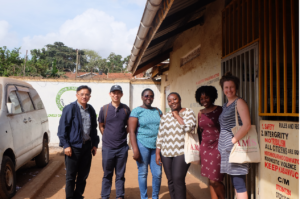
Fostering connections
Beyond a general ethos, how does one go about in building strong connections between ethnographers working in different field spaces? In AMIS, a step towards this was a series of annual workshops in London. Komatra and Clare describe their intensive two-week inception meeting:
“We talked a lot about concepts, theories, discussions with our mentors, and look into many, many possible ways of data collection.”
“Our first annual meeting was fantastic because we had the Thai team, the Uganda team, our [London] team, and then our amazing mentor group, who all came and presented from completely different disciplines. And we received so much input, and it was really stimulating…people just threw everything in, threw the whole of themselves into this.”
Whilst participation in the meeting’s academic, networking and social activities were stimulating, they also required collaborators to confront their differing skillsets and backgrounds whilst surrounded by new colleagues. Susan recounts how:
“When I reflect on the first meeting… where we spent two weeks just trying to put together the ideas for the project and listening to experienced anthropologists, and also people from different fields that were not necessarily anthropology, was quite overwhelming and intimidating.”
Reflecting global health infrastructures, the AMIS programme was conducted in English. This placed an additional burden on the Thai researchers, as Luechai explains:
“There were a lot of discussions, interesting discussions, but academically, it’s difficult to connect to the things being discussed. And also, psychologically, you know, it’s not that easy to jump into the kinds of dialogue that they had.”
In subsequent years, nascent findings and dissemination strategies were discussed at these workshops (AMIS, 2021). In between, regular zoom calls were held, although the Ugandan team struggled with connectivity and were often only able to join with audio only.
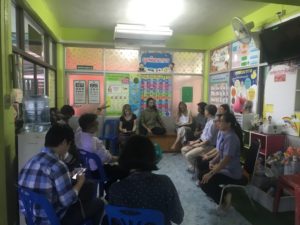
Making fruitful comparisons
Recognising the value of in-person meetings and to aid understanding one other’s research contexts, additional funds were obtained for a series of site visits. Luechai describes how:
“Our team visited Uganda and the Ugandan team visited Thailand. I think these things make AMIS really unique in the sense that I feel like we are… in a family of those who are interested in the same thing.”
These visits helped researchers to understand their own research sites, and the relative positions of biomedicine and traditional medicine, and public health and anthropology within their own countries. Clare and Susan take up the story:
“Visiting each other’s field sites, I think was really valuable in terms of thinking through the findings of the project. It’s always interesting when you have new outsiders that come to your field site, because they get to ask questions that you wouldn’t necessarily ask or wouldn’t even think to ask. And so, you see your interlocutors in a different way because they’re being asked something by a Thai person that has come to Uganda and is asking these questions.”
“When we visited Thailand, I remember the health centres and we were also able to visit some of their study participants that were bedridden. And so, that really opened our minds up to a different kind of set-up or different way of running things. For instance, we could see the differences between our health system and what their health system is like, the fact that they have this thing in the formal health system where they allow for use of herbal treatments antibiotics, which is something we don’t have in Uganda. So, there is that comparing and contrasting that goes on just by exposure to the study site. But also, just seeing how much anthropology was valued in Thailand in general as a field of study was quite interesting because in Uganda we do not have that. And it’s easy to think that it’s the same everywhere. Social science is just social science [laughs].”
When asked which was most productive in terms of the zoom calls, site visits and workshops, Susan continues:
“It’s, sort of, almost as if all these things complement each other. I mean when people are presenting what’s coming out of their field notes and then you’re also drawing on what you saw from the site visits, and then you’re also thinking of what has been discussed in the annual meeting, it, sort of, does the same thing in terms of helping you think of your findings in terms of what other people are doing and ask questions that maybe you wouldn’t have asked ordinarily because of how you view your study site or being familiar with everything…They all work together to help us ask these kinds of questions, to help us see different angles of things.”
Whilst the site visits where helpful in rendering visible the common sense at play in one’s own research sites, it took longer to make progress in the planned international comparison analysis. Whilst research plans were initially quite similar, protocols diverged to fit the differing interests, contexts and expertise of the teams. Komatra describes how, despite the visits:
“In terms of really connecting to what is going on in Uganda, we don’t really have a full understanding of that. This is also reflected in the very, very difficult task of trying to write a cross-site paper, you know? Because Thailand’s issues that they are dealing with is quite, quite different both in terms of contextual or in terms of actual things that are going on… So, when we try to compare, it’s very difficult to find things that are, for instance, a common concern, or share some of the aspects that can be easily put together into a comparative paper that can discuss both the Ugandan situation and the Thai situation.”
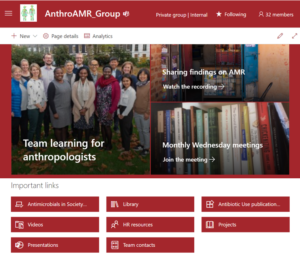
Writing together under pandemic conditions
As the focus of the project shifted towards analysis and dissemination, the COVID‐19 (SARS‐CoV‐2) pandemic caused the carefully planned programme of international visits and workshops to be suspended. Rather than sitting shoulder to shoulder to analyse data and draft manuscripts, emails shuttled back and forwards. Undertaking this stage of a collaborative ethnographic project was always going to be challenging, as Komatra explains:
“Anthropologists tend to work individually. I mean the way we think, the way we write, the writing style, how we look at things is deeply personal… So, how are we going to collaborate? Whose voice actually dominates the manuscript that we are writing? So that is something that needs a lot of exchange, a lot of dialogue and a lot of reciprocity. What I do and what other people do, and how these things can then be mixed together? This really depends on good relationships, which I would say that because AMIS project is long-term, kind of four years.”
Another negotiation was the relative contribution of empirical and theoretical data, as Luechai picks up:
“So how to balance between having rich ethnographic work and having good, relevant theoretical framework was important.”
Divergent approaches might be explained through personal interests, different anthropological traditions and the relative accessibility of a theoretical literature typically written in English by academics based in the global North. Luechai continues:
“If language is not the barrier that much, then perhaps we might be able to gain more benefit from the kinds of networks and relationships. And, one thing that I would emphasize this isn’t like in Africa, the research team from London, they cannot make use of Thai language [laughs]… So that is a barrier, that prevents us from getting close to each other, from learning more closely. Because, yeah, if the London team can understand Thai or we can understand English better, I think perhaps you might be able to make use of the things that we have learned from the field.”
Unlike biomedical research, the process of writing is central to ethnographic analysis. Local research teams partnered with London-based researchers who supported this process. Clare and Komatra reflect:
“It’s been a learning process for all of us involved as to how to empower people as individual team members to complete the full ethnographic process of doing the research through to writing up and doing all of the analysis and thinking, and also to be able to offer what is actually quite a large team the sufficient support to be able to do that.”
“We expect writing in anthropological research can bring about things that really provide new insights to the problem, really gives a holistic view that makes the subject that we study illuminating… We did this book, it’s written in Thai, all these papers are from AMIS projects. We can write it in Thai, of course, but when we make it into English manuscripts we work with researchers that come and collaborate with us. And these researchers are key, are crucial…[they] provide experience of co-authoring, maybe help to do certain kinds of framing, drafting, editing.”
Amidst these challenges, a factor that made the process of collaborative ethnography easier was the complex topic. Clare explains:
“It’s a good thing that that topic of antibiotic use has so many different strands that can be pulled. So, I think this kind of topic was amenable to a collective approach, because there were so many questions to be asked, there was space for people to do really quite diverse projects in diverse sites, all under the same umbrella with the same sort of research question. I don’t know that all public health problems would be amenable to that.”
- A small step towards transnational partnership?
In seeking to be a genuinely collaborative transnational partnership, the AMIS project made strides towards doing global health differently. Time, adequate resources and the care-ful curation of nascent connections helped when undertaking collaborative ethnography. Being open minded and supportive to a diversity of thought, methodologies and expertise helped to rebalance flows between the global North and the global South, and encourage South-South connections. The co-investigators agree that was a special project to work on as Komatra and Susan explain:
“At a really, really personal level, the AMIS programme really changed me, changed the way I look at things, the way I work with other people, the way collaborations can be realised and the way academic work can be more engaging both internationally and policy wise.”
“We’ve grown so much in terms of individual researchers but also as an institution in terms of social science. There’s still a lot to do, but this is a stride in the right direction in terms of building social science not just in our institution but in our country… When we talk about AMR in Uganda and social science they will quickly point you to AMIS. So, yeah, that’s a really good legacy it leaves behind.”
However, despite motivated researchers working together over several years on a relatively well funded programme, they still came up against the wider architecture of global health that places researchers in particular roles and expectations. Komatra and Clare reflected upon how much change a single project can trigger:
“To really force a South to South relationship and make it fruitful, it needs a lot of effort. I think AMIS was able to do [this] up to a level only, it’s not the main objective of the programme. The main objective of the programme is to really generate these fresh ideas about AMR on the one hand and, on the other, develop, I mean, building the capacities of local researchers.”
“We want to build into those lots of reflections on who gets power, who gets to say, who gets to hold the purse strings, and all of that kind of thing as we attempt to continue to attempt to decolonize the global health research infrastructure.”
The project was unable to challenge the infrastructural role of the English language within global health. In the future, affordable and accurate translation using artificial intelligence of field notes and research literature, for example, may partly mitigate against this, enabling information to be equally accessible within transnational research partnerships. The central position of English with global health also acts as a ‘hidden paywall’ that has to be overcome by researchers in the global South seeking to publish in international journals (MoChridhe, 2019). Within AMIS, native English-speaking researchers partnered with colleagues to overcome this barrier. However, this resulted in voices being diluted as they were made acceptable for publication. This way of working provides another example of gatekeeping in global health; when actors shape the flow of information and resources and, potentially, perpetuate power inequalities between the global North and South (Tilley and Kalina, 2021).
Language barriers also added further complexity to doing ethnography collaboratively, an intellectually different undertaking from solitary ethnography (Pickering and Mujumbusi, 2021) . The lens of decolonisation has prompted renewed interest in long-running debates surrounding whose voice is heard through ethnographic endeavours (Clifford and Marcus, 1986). For example, the roles of insider (local) and outsider (foreign) perspectives, and the privileged etic vantage point reserved for those from the global North (Williams, 2018; Abimbola, 2019; Tilley and Kalina, 2021; Urassa et al., 2021). To date, however, there has been limited discussion of the process of doing ethnography by teams of researchers with different native languages.
The dominance of the English language is one aspect of global health architecture that continues to situate the global North at its centre. It was against the backdrop of these arrangements that AMIS researchers strived to do things differently. This required living with the ‘uncomfortable knowledge’ (Rayner, 2012) that awareness and willingness to change cannot trigger the much needed redesign of broader pathways of power. As noted elsewhere (Lawrence and Hirsch, 2020; Abimbola et al., 2021; Chaudhuri et al., 2021; Khan et al., 2021), there is much still to be done.
Acknowledgements:
AT is very grateful to the AMIS co-investigators – Susan Nayiga, Professor Luechai Sringernyuang, Professor Komatra Chuengsatiansup and Professor Clare Chandler – who shared their insights that form the basis of this paper.
The Antimicrobials In Society (AMIS) grant was awarded by the Economic and Social Research Council (ESRC) on behalf of the Antimicrobial Resistance Cross Council Initiative supported by the seven Research Councils UK (RCUK) in partnership with other funders [ES/P008100/1].
References:
Abimbola, S. (2019). The foreign gaze: authorship in academic global health. BMJ Glob Health 4(5), e002068. doi: 10.1136/bmjgh-2019-002068.
Abimbola, S., Asthana, S., Montenegro, C., Guinto, R.R., Jumbam, D.T., Louskieter, L., et al. (2021). Addressing power asymmetries in global health: Imperatives in the wake of the COVID-19 pandemic. PLoS Med 18(4), e1003604. doi: 10.1371/journal.pmed.1003604.
AMIS (2021). “AMIS Final Report”. (London, UK: Lonson School of Hygiene and Tropical Medicine).
Chaudhuri, M.M., Mkumba, L., Raveendran, Y., and Smith, R.D. (2021). Decolonising global health: beyond ‘reformative’ roadmaps and towards decolonial thought. BMJ Glob Health 6(7). doi: 10.1136/bmjgh-2021-006371.
Clifford, J., and Marcus, G. (1986). Writing Culture: The Poetics and Politics of Ethnography. Berkeley, US University of California Press.
Hinchliffe, S. (2021). Postcolonial Global Health, Post-Colony Microbes and Antimicrobial Resistance. Theor Cult Soc, 0263276420981606. doi: https://doi.org/10.1177/0263276420981606.
Khan, M., Abimbola, S., Aloudat, T., Capobianco, E., Hawkes, S., and Rahman-Shepherd, A. (2021). Decolonising global health in 2021: a roadmap to move from rhetoric to reform. BMJ Glob Health 6(3). doi: 10.1136/bmjgh-2021-005604.
Kuper, A. (2004). “The comparative method in social anthropology,” in The Social Anthropology of Radcliffe-Brown, ed. A. Kuper. (London, UK: Routledge).
Lawrence, D.S., and Hirsch, L.A. (2020). Decolonising global health: transnational research partnerships under the spotlight. Int Health 12(6), 518-523. doi: 10.1093/inthealth/ihaa073.
MoChridhe, R. (2019). Linguistic equity as open access: Internationalizing the language of scholarly communication. The Journal of Academic Librarianship 45(4), 423-427. doi: https://doi.org/10.1016/j.acalib.2019.02.006.
Pai, M. (2021). Decolonizing Global Health: A Moment To Reflect On A Movement [Online]. New York, US: Forbes.com. Available: https://www.forbes.com/sites/madhukarpai/2021/07/22/decolonizing-global-health-a-moment-to-reflect-on-a-movement/?sh=2048fcbf5386 [Accessed].
Pickering, L., and Mujumbusi, L. (2021). “Analysing assumptions: power, precarity, and collaborative ‘writing up’”, in: ASA2021: Responsibility Conference. (Online: Association of Social Anthropologists of the UK).
Rayner, S. (2012). Uncomfortable knowledge: the social construction of ignorance in science and environmental policy discourses. Economy and Society 41(1), 107-125. doi: 10.1080/03085147.2011.637335.
Richardson, E.T. (2019). On the coloniality of global public health. Medicine Anthropology Theory 6(4). doi: https://doi.org/10.17157/mat.6.4.76.
Tilley, E., and Kalina, M. (2021). “My Flight Arrives at 5 am, Can You Pick Me Up?”: The Gatekeeping Burden of the African Academic. Journal of African Cultural Studies, 1-11. doi: 10.1080/13696815.2021.1884972.
Urassa, M., Lawson, D.W., Wamoyi, J., Gurmu, E., Gibson, M.A., Madhivanan, P., et al. (2021). Cross-cultural research must prioritize equitable collaboration. Nat Hum Behav 5(6), 668-671. doi: 10.1038/s41562-021-01076-x.
Williams, L.D.A. (2018). Mapping Superpositionality in Global Ethnography. Science, Technology, & Human Values 43(2), 198-223. doi: 10.1177/0162243917711005.
Yates-Doerr, E. (2019). Whose Global, Which Health? Unsettling Collaboration with Careful Equivocation. Am Anthropol 121(2), 297-310. doi: 10.1111/aman.13259.
Yates-Doerr, E., and Maes, K. (2019). “Global Health,” in Cambridge Encyclopedia of Anthropology. (Cambridge: University of Cambridge).
Author bio:
Until recently, Alice Tompson was a research fellow with the Antimicrobials in Society group at London School of Hygiene and Tropical Medicine. Her doctoral research used ethnographic methods to explore antibiotic use by UK companion animal veterinarians.
Commentary
Care-ful collaboration: reimagining ethnography in transnational global health...
In this AMIS Commentary, Alice Tompson presents reflections on the collaborative working of the Antimicrobials in Society research teams, based...
AMR Training for Social Scientists
In this Q&A, Karlijn Hofstraat and Danny de Vries tell us about their “SPECIAL-SOC AMR” curriculum, a fantastic learning resource...
AMIS Final Report
We are delighted to release our AMIS Final Report. The report summarises the key activities, findings and outputs from the...






Care-ful collaboration: reimagining ethnography in transnational global health research